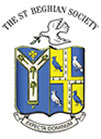|
 |
The Old St Beghian | |
| Jan 2018 | |||
Following the previous Bulletin we now print the second of the tributes to
the three OSB winners of the Victoria Cross.
By doing this, we do not in any way wish to diminish the contribution
and sacrifice made by all those former members of the school
who served their country at that time.
LEST WE FORGETCaptain Richard William Leslie Wain VC (SH 11-14)
Richard Wain was born in Penarth near Cardiff on the 5th of December 1896. Prior to joining St Bees he was educated at The Cathedral School, Llandaff and then at Penarth Grammar School. Like so many of his fellow St Bees students he joined the Officer Training Corps.
On the outbreak of the Great War, aged 18, despite having won a scholarship to attend Oxford University, he promptly joined up through the Public Schools Battalion of the Territorial Army and was commissioned into the Manchester Regiment on 16th July 1915 and served in France.
On the opening day of the battle of the Somme on the 1st July 1916, Captain Wain was badly wounded as he led his men forward. At this time, he was serving as an officer of 17th Battalion of the Manchester Regiment and his unit suffered severe casualties following their successful capture of the village of Montauban.
Following this, Captain Wain joined the Heavy Section of the Machine Gun Corps and was allocated to A Battalion. His unit, which was equipped with tanks, took part in the Battle of Messines in June 1917, Wain's tank reaching its final objective and destroying a number of German machine guns which were in a concrete emplacement.
He was 20 years old, and a Section Commander and Acting Captain of A Battalion, Tank Corps based at Marcoing, near Cambrai, France when, on 20th November 1917, his tank took a direct hit killing all but him and one member of his crew. Though severely wounded he rushed an enemy strong point with a Lewis gun, capturing it and taking about half the garrison prisoners. His actions allowed the infantry, which had been pinned back by the machine gun post, to advance. He was killed shortly afterwards while continuing to fire on the retiring enemy. Captain Wain was posthumously awarded a Victoria Cross for his heroic actions -
“….For most conspicuous bravery in command of a section of Tanks. During an attack the Tank in which he was, was disabled by a direct hit near an enemy strong point which was holding up the attack. Capt. Wain and one man, both seriously wounded, were the only survivors. Though bleeding profusely from his wounds, he refused the attention of stretcher-bearers, rushed from behind the Tank with a Lewis gun, and captured the strong point, taking about half the garrison prisoners. Although his wounds were very serious he picked up a rifle and continued to fire at the retiring enemy until he received a fatal wound in the head. It was due to the valour displayed by Capt. Wain that the infantry were able to advance."
The London Gazette, 13 February 1918Credit: St Bees Village Website.
Home
The St Beghian Society
St Bees School,
St Bees, Cumbria, CA27 0DS.
Tel: (01946) 828093 Email: osb@stbeesschool.co.uk
Web: www.st-beghian-society.co.uk
![]()
.jpg)